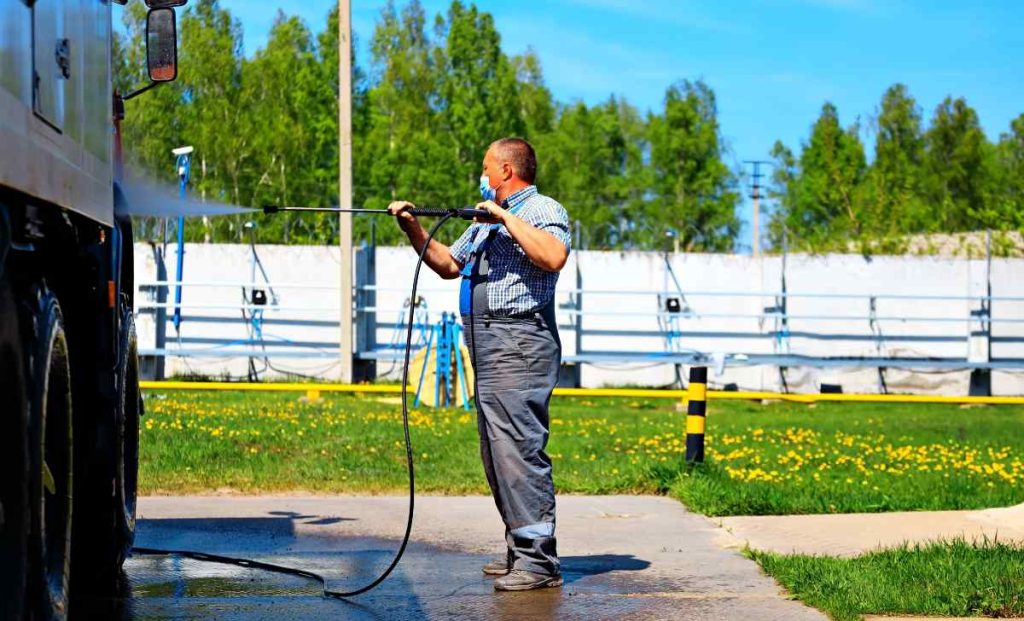In Queensland, it’s easy to assume your machines are tough enough to power through winter with little to no preparation. Proceed at your own risk if that’s your mentality. Even though we don’t get icy afternoons, winter can still drop close to or below zero in certain areas and cause damage to your expensive machines and heavy equipment.
Preventable damage is the worst kind, because you’ll be kicking yourself for not doing what you were supposed to be when forking out of pocket for repair costs. That’s why it’s critical to prepare your fleet before temperatures drop, or if you haven’t started yet, get in before it’s too late.
Although you’re unlikely to find snow in the Sunshine State, owners of CAT, John Deere or other popular heavy machinery brands will all benefit from properly preparing in QLD.
Pre-Winter Inspections: What to Check Before the Cold Sets In
Now that winter weather is rolling in, it’s time for some pre-winter inspections to make sure your heavy machinery is ready for the cold.
First, check all fluids – engine oil, coolant, brake, power steering, windshield washer, etc. Make sure levels are topped up with the proper cold weather fluid. As temperatures drop, regular fluids can lose viscosity and won’t protect as well.
Next, inspect hoses and belts for any signs of wear or damage. Have them replaced if needed. Cold weather can cause hoses and belts to become brittle, and the last thing you want is for one to burst while operating the machine.
Batteries also need attention before winter. Clean terminals and test battery charge – cold reduces capacity, so you’ll want a fully charged battery. Consider a battery blanket or heater to make it easier for the battery to crank the engine in very cold weather.
Fuel is another important thing to consider. As temperatures drop, condensation can form in fuel tanks and lines, freezing and clogging filters or injectors. Add a fuel stabiliser to prevent this, and fill tanks to prevent condensation build-up.
Finally, test all heating and defrosting systems to ensure proper operation before the cold sets in. Check that vents are clear and seals intact, and repair or replace any components not working properly.
With some pre-season maintenance and the proper preparations taken, your machinery will be ready to tackle anything winter throws your way. Be safe out there!
The Consequences of Failing to Winterise Equipment in Australia
If you don’t properly prepare your heavy equipment for the cold winter months down under, you’re in for some nasty surprises.
- Rust and corrosion will run rampant. Australia’s humid climate combined with salty sea air means metal parts corrode quickly. Without rust inhibitors and protective coatings applied, hydraulic cylinders, chains, and other critical components won’t last long.
- Fuels and fluids will freeze. Diesel and hydraulic fluid both gel up in frigid weather if you don’t use special winter formulas. Frozen brakes, stuck pistons, and non-responsive controls are dangerous and costly to fix.
- Batteries drain faster. Cranking an engine in cold weather requires more juice, and batteries already work less efficiently in the cold. An unmaintained or underpowered battery probably won’t start your machine on a frosty morning.
- Rubber and seals crack. Hoses, belts, gaskets, and o-rings become brittle in low temperatures and won’t seal or grip properly. Leaks, slips, and overheating issues may appear.
Neglecting to winterise and protect your equipment can lead to time-consuming, expensive breakdowns and repairs. Following some simple precautions like using antifreeze, rust inhibitors, battery maintainers, and insulated tarps or sheds to protect from the elements will help ensure your heavy machines are ready to work when winter’s over.
Your equipment is a big investment, so a little preventative maintenance during the off-season makes good business sense. With the proper winterisation and care, your machines will be fit and ready to handle any job next season and for many more years to come.

Battery Care in Cold Weather: How to Ensure Maximum Power
Cold weather can be brutal on heavy machine batteries. As temperatures drop, battery power and performance decrease significantly—up to 50% in extreme cold. To ensure your equipment starts when you need it and have maximum power available, proper battery care during winter is essential.
Test and Replace Old Batteries
Over time, all batteries lose capacity and the ability to hold a charge, even more so in cold weather. Have heavy machine batteries load tested before winter to check their condition and replace any weak or old batteries. Most manufacturers recommend replacing batteries 3-5 years from the in-service date for the best performance, especially in demanding weather conditions. Fresh, high-quality batteries will have no trouble starting and operating in even the coldest temperatures.
Engine Strain In Winter
During winter, heavy machinery engines are under increased strain, so it’s important to take extra precautions to keep them running well.
Use a lighter oil
Switch to a lighter, less viscous oil for the winter months. Thinner oils flow more easily in cold temperatures, keeping your engine properly lubricated. Heavier oils can thicken, making it harder for the oil pump to circulate the oil. This can lead to reduced performance and engine damage over time.
Australian Standard AS 3570 sets limits on cloud points for fuel, depending on the time of year and the weather in Australia. If you’re using fuel in a colder area, you might need to switch up your fuel during winter to stop it from waxing up and causing problems.
Check your coolant
Make sure your radiator is filled with a proper coolant and water mixture for your climate. Coolant contains antifreeze which lowers the freezing point of the fluid in your radiator and engine. Without enough antifreeze, the coolant can freeze, overheating your engine. Follow the recommendations in your owner’s manual for the correct coolant-to-water ratio for your heavy equipment.
Use fuel additives
Additives like isopropyl alcohol can help prevent fuel gelling in very cold weather. Gelled fuel will not flow properly to the engine, causing hard starts, stalling, and reduced performance. Diesel fuel, in particular, can start to gel below freezing temperatures. This isn’t something most Australian’s will need to do, but if your worksite gets below freezing like several inland operations do, it’s something to consider. Fuel additives and winterized diesel can help prevent gelling even in extreme cold.
Install a block heater
A block heater helps keep your engine block and coolant warm when the vehicle is parked. Plugging in your block heater for at least 4 hours before operating the vehicle will make for much easier starts in cold weather and reduce strain on the engine and battery. The block heater reduces warmup time and allows the vehicle to operate at optimal temperature sooner.
Check your glow plugs
Diesel engines rely on glow plugs to help start the engine in cold weather. Glow plugs heat the combustion chambers before startup so the engine can ignite the fuel. If your glow plugs are not functioning properly, your diesel vehicle will be very hard to start in cold temperatures and will run roughly until the engine is warmed up. Have your glow plug system tested if you experience problems with cold starts.
Following these tips for preparing heavy equipment for winter will help reduce strain on the engine, prevent damage, and keep your vehicle running well all season long. With the proper precautions taken, your equipment will be ready for any job, no matter the weather.

Storing Heavy Machinery Over Winter: How to Properly Shut Down Equipment for the Season
Drain All Fluids
The first step in properly shutting down your heavy equipment for winter is draining all fluids – fuel, coolant, hydraulic oil, and any other liquids. This prevents leaks, corrosion, and freezing over the winter.
Replace Filters
Next, replace air, oil, fuel and hydraulic filters. Fresh filters will allow your equipment to operate more efficiently when you start it up again in the spring.
In winter, oil filters have to work harder and can be put under greater strain, especially during the initial burst of pressure during a cold start. So, it’s important to ensure your Cat oil filters are in top condition before winter hits. You can find oil filter recommendations in the operational manual for each machine. For professional advice on winter-specific engine oil and filter recommendations in your region, you can contact your local Cat equipment expert at a Hastings Deering branch near you.
Grease and Lubricate
Grease and lubricate all joints, pivots and cylinders according to the specifications in your owner’s manual. This protects parts from rusting and seizing up over the winter months.
Disconnect Battery
Disconnect the battery to prevent it from draining over winter. Remove the battery from the machine if possible and store it on a trickle charger. Charge the battery fully before storing.
Park on Blocks
Raise and support tracks, wheels or outriggers on concrete blocks to prevent flat spots. Deflate tires slightly once supported.
Cover and Protect
Cover your equipment with a breathable tarp or canvas to protect from snow and rain while still allowing for ventilation. Tie the covering down securely to prevent wind damage.
Store Indoors if Possible
Storing machinery in a garage or shed over winter provides the best protection. If indoor storage isn’t possible, choose a level area that won’t flood and cover as described above.
Following these steps will ensure your heavy equipment is properly shut down and protected over the winter months. When spring arrives, your equipment will be ready to start up again without issue. Performing regular seasonal maintenance like this helps maximise the lifespan of your machinery and reduces costly repairs down the road.
Bring Your John Deere Machine Into APT Spray Painting
So there you have it, five solid reasons why giving your John Deere equipment a fresh coat of paint should be high on your to-do list this year. A new paint job will make your machinery look as good as new, protect it from the elements, increase its lifespan and resale value, and give your business a professional image. The benefits far outweigh the costs and hassle. What are you waiting for? Get in touch with APT Spray Painting and ask about our painting and refurbishment services. Your machinery, and your business, will thank you for it. A splash of colour can go a long way.



